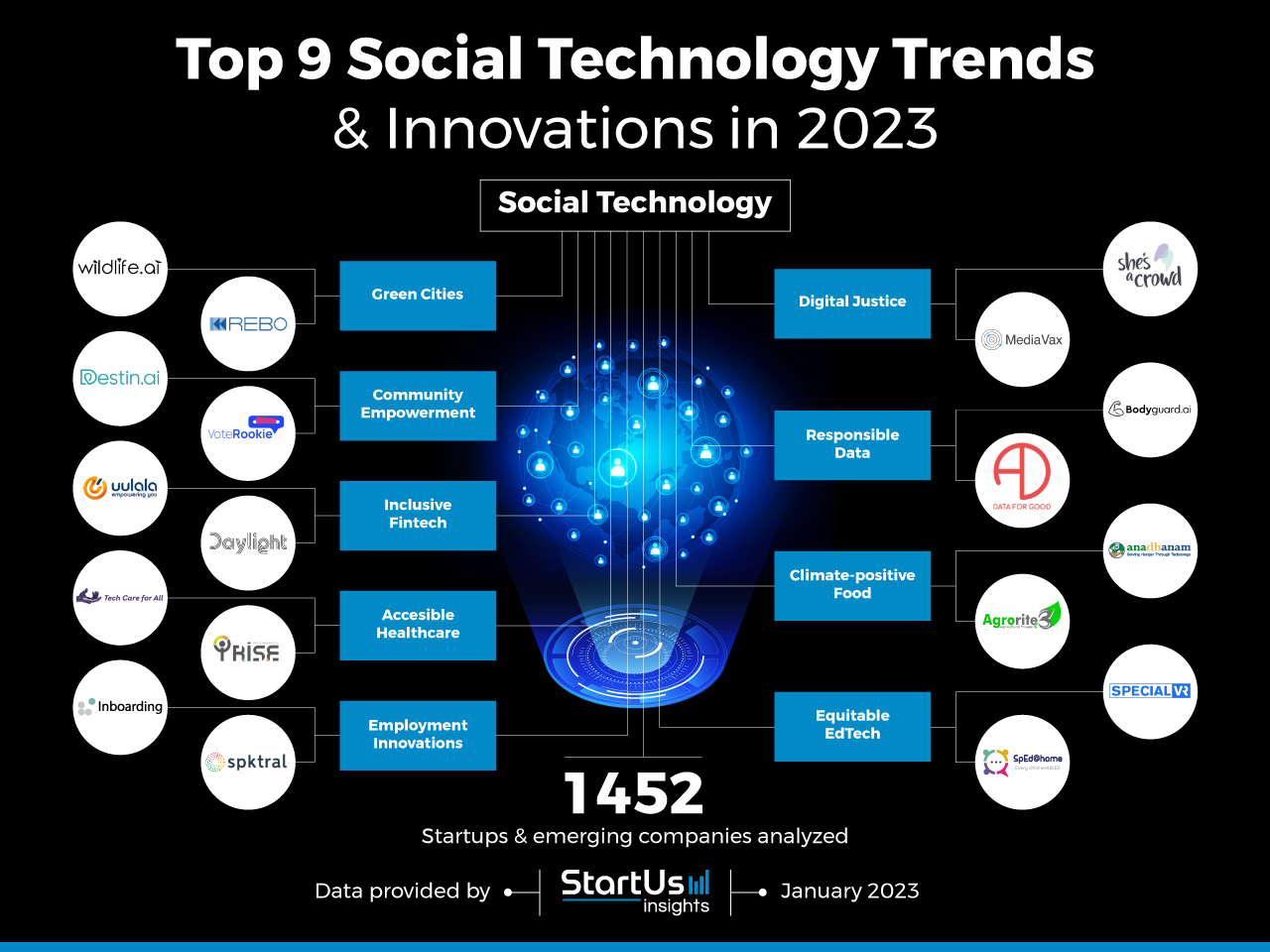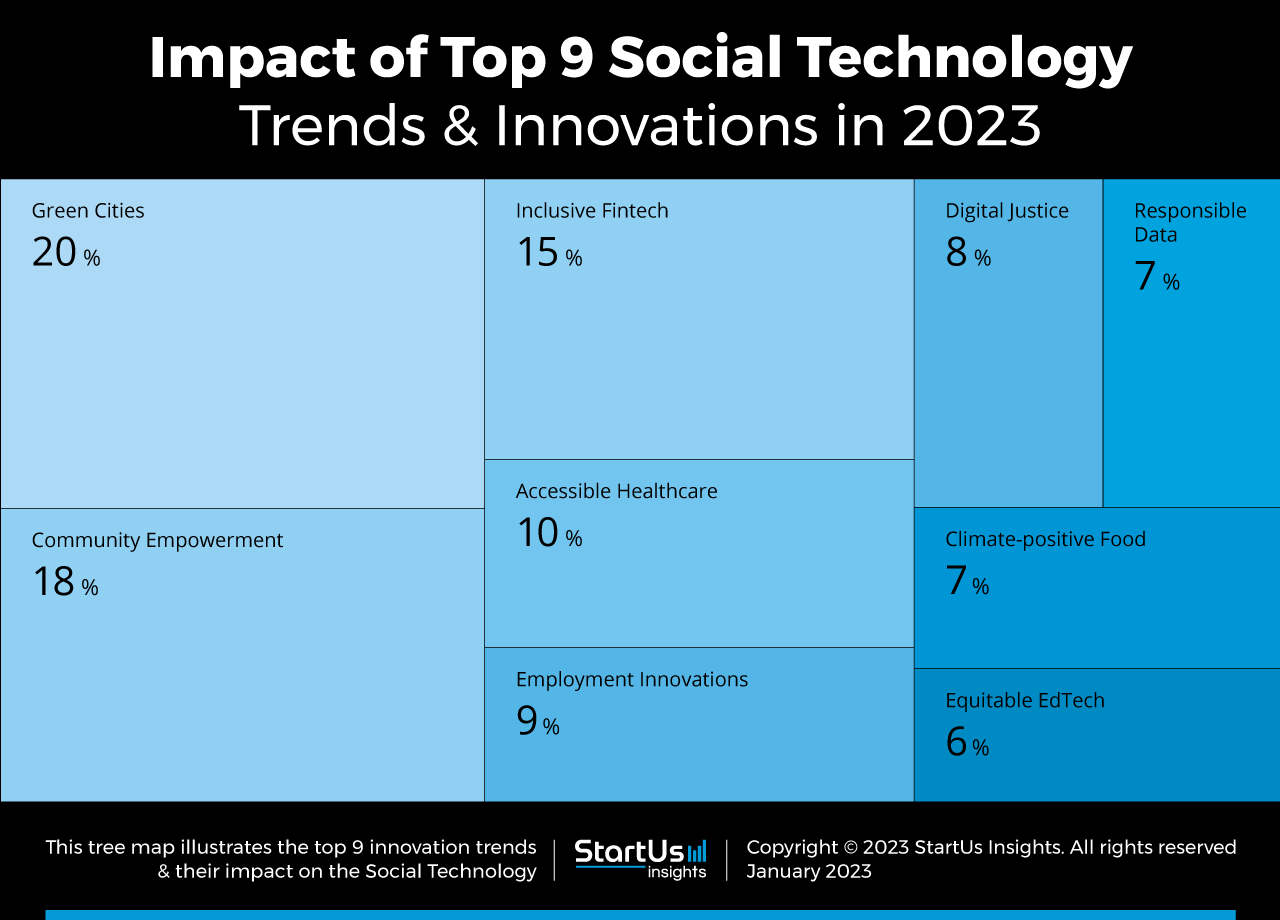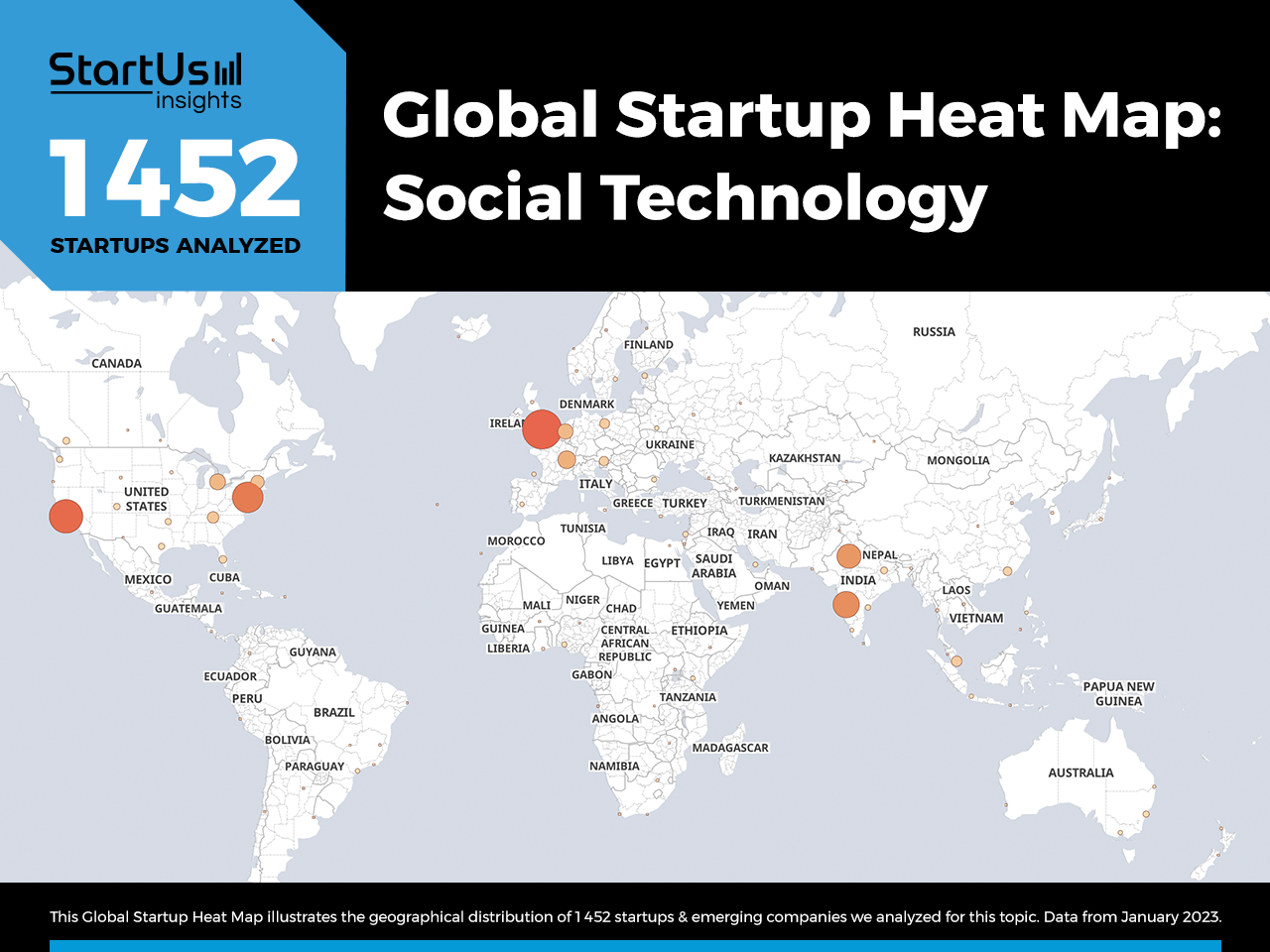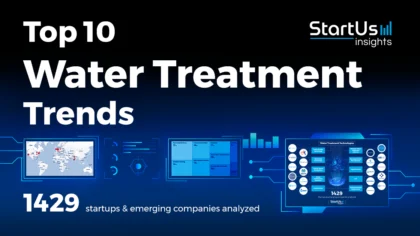The social tech industry applies digital advancements to tackle the world’s most pressing social and environmental challenges. Tech for social good plays a crucial role in achieving the United Nations (UN) Sustainable Development Goals (SDG). It also connects with hard-to-reach regions without internet access in a fast and cost-effective way. Together with automation, social technology supports combating inequality, poverty, and hunger. It also democratizes access to energy, information, employment, education, and healthcare. Moreover, social tech combines artificial intelligence (AI), data analytics, blockchain, and cloud computing to make financial services more inclusive and sustainable. Finally, social innovations make the internet more responsible and accountable to tackle misinformation, online bullying, and cyber violence.
Innovation Map outlines the Top 9 Social Technology Trends & 18 Promising Startups
For this in-depth research on the Top Social Technology Trends & Startups, we analyzed a sample of 1 452 global startups and scaleups. The result of this research is data-driven innovation intelligence that improves strategic decision-making by giving you an overview of emerging technologies & startups in the social tech sector. These insights are derived by working with our Big Data & Artificial Intelligence-powered StartUs Insights Discovery Platform, covering 2 500 000+ startups & scaleups globally. As the world’s largest resource for data on emerging companies, the SaaS platform enables you to identify relevant startups, emerging technologies & future industry trends quickly & exhaustively.
In the Innovation Map below, you get an overview of the Top 9 Social Technology Trends & Innovations that impact social tech companies worldwide. Moreover, the Social Tech Innovation Map reveals 18 hand-picked startups, all working on emerging technologies that advance their field.
Top 9 Social Technology Trends in 2023
- Green Cities
- Community Empowerment
- Inclusive Fintech
- Accessible Healthcare
- Employment Innovations
- Digital Justice
- Responsible Data
- Climate-positive Food
- Equitable EdTech
Tree Map reveals the Impact of the Top 9 Social Technology Trends
The Tree Map below illustrates the impact of the Top 9 Social Tech Trends. Green cities, which is one of the most impactful trends, use renewable energy to alter unsustainable behavior. Meanwhile, community empowerment promotes diversity, equality, and civic engagement through various digital platforms. Further, financial inclusion applies blockchain, AI, and cloud computing making financial products and services accessible for economically underprivileged people. Also, social innovations build accessible healthcare through immersive technology, automation, and smart wearables. Moreover, remote access enables equal employment opportunities for people with disabilities. Additionally, startups create climate-positive food and improve the livelihood of farmers in poorer regions. Lastly, startups develop anti-violence measures based on advanced data analytics and machine learning. This identifies abusive behavioral patterns and protects youth from online abuse.
Global Startup Heat Map covers 1 452 Social Technology Startups & Scaleups
The Global Startup Heat Map below highlights the global distribution of the 1 400+ exemplary startups & scaleups that we analyzed for this research. Created through the StartUs Insights Discovery Platform, the Heat Map reveals that much of the startup activity is concentrated in Western Europe and the US.
Below, you get to meet 18 out of these 1 452 promising startups & scaleups as well as the solutions they develop. These social technology startups are hand-picked based on criteria such as founding year, location, funding raised, and more. Depending on your specific needs, your top picks might look entirely different.
Top 9 Social Technology Trends in 2023
1. Green Cities
The green cities trend leverages technology to build a livable and sustainable environment. Social tech enables responsible consumption, a circularity of resources, and reduced wastage in smart cities. For instance, highly sensitive IoT sensors improve water and waste management. AI and data analytics improve the monitoring of endangered species and the prevention of wildfires. Digital platforms encourage citizens to use renewable energy. To achieve that, startups combine machine learning and psychology that change unsustainable behavior. They provide learning materials and guidance that are intuitively easy to install in daily life. So, the drastic growth of cities and urban centers is respectful of the environment.
Rebo Smart Bottle enables Plastic Recycling
Rebo Smart Bottle is a Swiss startup that manufactures bottles from recycled materials to reduce plastic in the oceans. The smart bottle features IoT sensors that detect the volume of drunk water to remind users to stay hydrated. Also, the startup encourages people to use fewer plastic bottles and supports ocean cleaning initiatives. The smart bottle has a mobile app that calculates the number of saved plastic bottles. Further, the recorded savings are converted into credits to fund ocean clean-ups. So, the Rebo smart bottle helps not only optimizes hydration but also brings a positive environmental impact.
Wildlife.ai advances AI-based Wildlife Conservation
Wildlife.ai is a New Zealand-based organization that advances AI-driven wildlife conservation. The startup includes different tech campaigns for environmental protection and education. Using AI, researchers track wildfire patterns and predict the extinction of endangered animal species. For example, the projects implement machine learning to identify fish in baited underwater videos. Another project uses smart cameras to monitor herpetofauna and invertebrates. Moreover, Wildlife.ai teaches programming classes to implement AI in biodiversity conservation.
2. Community Empowerment
One of the most common applications of social tech is for community empowerment. Social innovations fight discrimination and inequality across ethnicity, religion, sexual orientation, and disability. For example, startups develop testing tools for web accessibility. The system suggests how to fix website errors by imitating people with disability. Also, AI-based platforms offer advanced analytics to support activists in social media engagement. Nowadays, reaching out to audiences is expensive and time-consuming. Digital participation platforms, on the contrary, connect communities with authorities and lawmakers. Thus, citizens receive consultations on local topics and take part in important decisions.
Destin AI improves Immigration Processing
Destin AI is a startup from Canada that improves immigration processes, navigating applicants using AI. The chatbot improves the application experience by checking the eligibility for a visa. Additionally, the AI-based platform reviews documents and securely stores them in one place. So, students and jobseekers have higher chances to achieve their immigration goals.
Vote Rookie builds a Digital Democracy Platform
Vote Rookie is a German startup that develops a digital democracy platform. The platform focuses on the political engagement of underrepresented communities. The startup’s web-based app combines digital tools, civic education, and gamification to involve more young people and women. It also allows users to launch, monitor, and manage civic initiatives. Moreover, it enables users to directly engage with politicians and elected authorities.
3. Inclusive Fintech
The rise of decentralized blockchain systems improves inclusion in financial services. Fintechs integrate low-cost instant transactions, microinsurance, IoT payments, and global multi-currency exchange. Startups utilize blockchain, AI, and cloud computing to help homeless and unbanked people. These technologies restore public trust in banking infrastructure. Also, refugees and migrants transfer money to families using a verified blockchain-based way. Moreover, data-driven strategies are changing the way people invest. Such solutions automate fundraising and analyze the social impact of companies.
Daylight offers Queer-friendly Banking
Daylight is a US-based startup that provides a digital banking platform for the LGBTQ+ community. Daylight allows using preferred names on cards for transgender customers. It also coordinates financial advising for users experiencing expensive hormonal treatments. Moreover, Daylight applies analytics to rate companies based on gender inclusivity. This brings visibility to queer-friendly companies supporting the values of the community.
Uulala offers Blockchain-based Fintech
US-based startup Uulala facilitates the financial inclusion of the under-banked and unbanked people. The platform provides blockchain-enabled services to build credit, transfer money, and participate in e-commerce. Blockchain technology also secures banking services with low monthly fees and cashback rewards. Thereby, Uulala removes barriers to financial services for underserved communities.
4. Accessible Healthcare
Digitalization is making health services accessible and affordable for vulnerable groups. E-health solutions provide easily accessible apps with free information that improve digital literacy in developing economies. Also, online consultations give access to high-quality care for people from different parts of the world. This helps to reduce economic and social disparities in healthcare. For example, AI-powered chatbots provide affordable professional advice to low-income people on reproductive and mental health topics. Moreover, augmented and virtual reality (AR/VR) together with gamification improve the physical activity of people with disabilities.
Tech Care for All provides Remote Health Monitoring
Tech Care for All is a Belgian startup that democratizes access to healthcare. To achieve that, the startup provides remote monitoring and diagnostics with easy-to-use mobile electronic health records (EHRs). For instance, iDeliver platform enables female birth attendants to perform in low-resource settings. Another telemedicine solution ReMeDi enables online consultations in hard-to-reach areas. Additionally, Healtcube offers smart diagnostics of various diseases employing sensors, Bluetooth-connected devices, and data analytics. Moreover, Tech Care for All resolves training skill gaps by building an affordable online learning hub for medical professionals.
Rise Mechanics 357 builds Mobility Robots
Bulgarian startup Rise Mechanics 357 manufactures mobility robotic devices for people with lower limb disabilities. The startup’s Omnibot Verticalizator is a lightweight mobility system that allows the human body to stay in a vertical position. The wheelchair has an electric drivetrain with axial movement for maximum maneuverability. Thus, vertical placement of physically impaired people resolves chronic health problems such as muscular spasms, deep vein thrombosis, osteoporosis, respiratory disabilities, and others. This way, the startup facilitates social inclusion and barrier-free movement for disabled people.
5. Employment Innovations
Social innovations in the employment sector promote equal job opportunities, fair reward systems, and a healthy work ethic. Technologies also help local employment, encourage self-development and support the employee’s health. For instance, AI platforms gather company knowledge to help people proactively learn new skills. Startups also create new job opportunities for refugees, migrants, and host community members promoting home-based freelancing, microwork, and digital entrepreneurship. These digital tools also create a tailor-made workspace for persons with disabilities fitting all their needs. Further, machine learning identifies pay discrepancies based on gender, ethnicity, disability, or any other characteristics to close the pay gaps and tackle hiring biases.
Inboarding creates Inclusive Employment Experiences
Brazilian startup Inboarding makes the employment experience diverse and inclusive. Inboarding’s tech solutions consist of a digital platform and AI-powered chatbot. The platform conducts surveys, tracks employees’ success, and utilizes AI analytics to construct inclusive experiences. In addition, Ella’s virtual assistant delivers personalized learning material that shapes workers’ behavior to create more humane work ethics.
Spktral offers Pay Gap Reporting
UK-based startup Spktral simplifies pay gap reporting across gender, age, ethnicity, and disability. The startup’s cloud-based platform analyzes raw data to derive actionable insights regarding financial inequalities. The platform’s features include compliance with the current legislation, interactive statistical modules, scenario-based experiments, and customizable summary reports. This way, the startup advances more inclusive human resources (HR) decision-making.
6. Digital Justice
The ubiquity of social media and digital technologies exposes vulnerable people to misinformation, violence, and social injustices. Therefore, government regulators mandate corporate online responsibility. AI algorithms detect and block harmful content such as online extremism and hate speech. Software tools allow users to report online sexual harassment and find suitable legal help. Another problem is widespread cyberbullying, which is difficult to track and respond to. Thus, startups develop machine learning techniques to evaluate problematic social media activity and word patterns with “near-human” accuracy.
She’s A Crowd enables Gender-based Violence Reporting
Australian startup She’s A Crowd applies a data-driven approach to combat gender-based violence. A lot of women from vulnerable groups, especially the LGBTIQ population, indigenous women, and women with disabilities, experience reporting issues. To resolve that, the startup uses an AI-based digital storytelling platform. The platform collects stories in a safe and anonymous manner, which are further geotagged and timestamped using analytics tools. The aggregated data delivers important insights for governments, universities, and NGOs to make cities safer for women and gender-diverse people.
MediaVax tackles Disinformation
MediaVax is a US-based startup that tackles disinformation using AI. MediaVax develops AI-powered tools to identify, monitor, and measure the impact of untrustworthy stories on social media. To achieve that, it analyzes and reports malicious online posts in real-time using mobile tools, APIs, and cloud-based software. Thereby, the platform identifies and predicts the spread of disinformation, fake news, and propaganda.
7. Responsible Data
Humanitarian organizations collect, process, and use large volumes of sensitive personal data. Since digital technologies impose risks to data breaches, cyber-attacks, and hacking, startups develop responsible data mechanisms to protect socially vulnerable communities. To achieve this, they automate data privacy compliance to meet regulatory requirements and build trust among users. For example, startups embed by default necessary privacy and security measures by default. Additionally, decentralized blockchain protects the digital identities of refugees. Self-sovereign identities enable users to gain back data ownership from third parties and governments. As a result, social tech helps people in need to receive humanitarian aid in a secure manner.
unCHAINed offers Digital Identities
unCHAINed is a startup with a global decentralized location that builds digital identities for refugees and displaced people using blockchain technology and biometrics. The Digital Identity and Resource Allocation System (DIRAS) leverages Ethereum protocols to connect digital token wallets and smart contracts to a global identity system. Meanwhile, React Native Fingerprint scanner secures identities through biometric data confirmation. Moreover, the system also fosters faster and more efficient distribution of humanitarian aid. By empowering displaced people with self-sovereignty over data, digital identities help to find work, apply for aid, and assimilate into society.
Data for Good delivers SDG Progress Monitoring
Data for Good is a Dutch startup that applies a data-driven approach to speed up the sustainability agenda. The startup’s platform measures and visualizes the progress of SDG development by various criteria like type of country, organization, mission, or project. By showcasing easily understandable data, Data for Good promotes transparency and accountability of authority actions for an eco-friendly future. Moreover, corporations and businesses enhance trust with customers through voluntary and public sharing of their environmental performance.
8. Climate-positive Food
Climate-positive food solutions reduce waste and carbon emissions while mitigating food insecurity and poverty. Social farming empowers low-income farmers to engage in sustainable and profitable food production. It fosters environmental knowledge and decreases gaps with urban markets through online platforms and e-commerce. Moreover, digital technologies such as AI, IoT and remote sensing using satellites improve the productivity of agriculture. The growing affordability of precision farming makes it accessible for smallholders. Furthermore, startups are growing sustainable food like edible algae on solar panels to produce healthy ingredients and reduce CO2 emissions.
Anadhanam builds Food Redistribution Platform
Indian startup Anadhanam provides a digital food redistribution platform. The platform amplifies the efforts of government agencies and NGOs connecting them with the network of suppliers and volunteers. It also maps hunger hotspots and Below Poverty Line (BPL) zones to precisely address the issues. Additionally, the mobile app tracks activities and provides food quality check statistics ensuring better management of excess food. Furthermore, the digital platform supports cause-driven campaigns to spread awareness and raise funds. This way Anadhanam reduces carbon emissions by preventing food waste.
Agrorite develops Digital Agricultural Network
Nigerian startup Agrorite develops a digital agricultural network to improve the livelihood of smallholder farmers. The platform equips small-income farmers with social impact investments, smart farming solutions, and access to profitable markets. Agrorite enhances farming productivity through satellite imagery, remote sensing systems, and interactive voice responses (IVRs). Also, the startup safeguards the safety of team members through the “Agrorite Bookie” technology minimizing the physical contact between stakeholders. Hence, Agrorite automates the farming process leading to an increased number of sustainable food products and income for farmers.
9. Equitable EdTech
Despite technological progress, a large portion of the population in rural and remote areas has limited or no internet access. To resolve that, machine learning and augmented reality create quality learning resources to share via text over low bandwidths. Another area is personalized learning for lower-attaining students from developing countries. For instance, social tech improves education and professional training for disabled people through AI and mixed realities. Further social innovations enable migrants from diverse educational backgrounds to adapt to the changing requirements of a globalized society. This way, refugees learn digital literacy skills, which makes them more employable in most industries.
SpecialVR creates VR-based Cognitive Games
Canadian startup SpecialVR develops virtual reality-based cognitive games and simulations for children with a broad range of special needs. The solutions offer a relaxing virtual multisensory environment, 3D drawing images, and vestibular therapy with a light simulation. The startup’s simulations improve concentration and focus. By creating VR spaces, SpecialVR allows affordable and quality learning access for students with autism and down syndrome.
SpEd@home provides Multi-sensory Learning Platform
SpEd@home is an Indian startup that offers a multi-sensory learning platform for children with special needs. The startup’s blended approach aids experts and special educators with immersive adaptive technologies. The e-learning programs provide interactive activities including remediation, occupational therapy, speech therapy, and socio-emotional coaching. Moreover, the platform uses AI to understand a child’s proficiency. Based on that, it delivers personalized learning suggestions to improve reading, handwriting, and math skills.
Discover all Social Technology Trends, Technologies & Startups
Emerging social tech trends are significantly changing various spheres ranging from education and healthcare to employment. Innovative new combinations of 5G, the edge, satellites, and other technologies with the cloud have transformative potential. The industry is enabling progress in democratizing data and decentralizing political control to create meaningful changes in civic society. Responsible data collection and secure blockchain are pushing digital ethical mechanisms to protect sensitive information. Besides that, cloud, IoT, drones, robots, and wireless technologies find use in food production, water conservation, and resilient supply chains.
The Social Tech Trends & Startups outlined in this report only scratch the surface of trends that we identified during our data-driven innovation and startup scouting process. Among others, decentralized data, desalination, and neobanking will transform the sector as we know it today. Identifying new opportunities and emerging technologies to implement into your business goes a long way in gaining a competitive advantage. Get in touch to easily and exhaustively scout startups, technologies & trends that matter to you!











